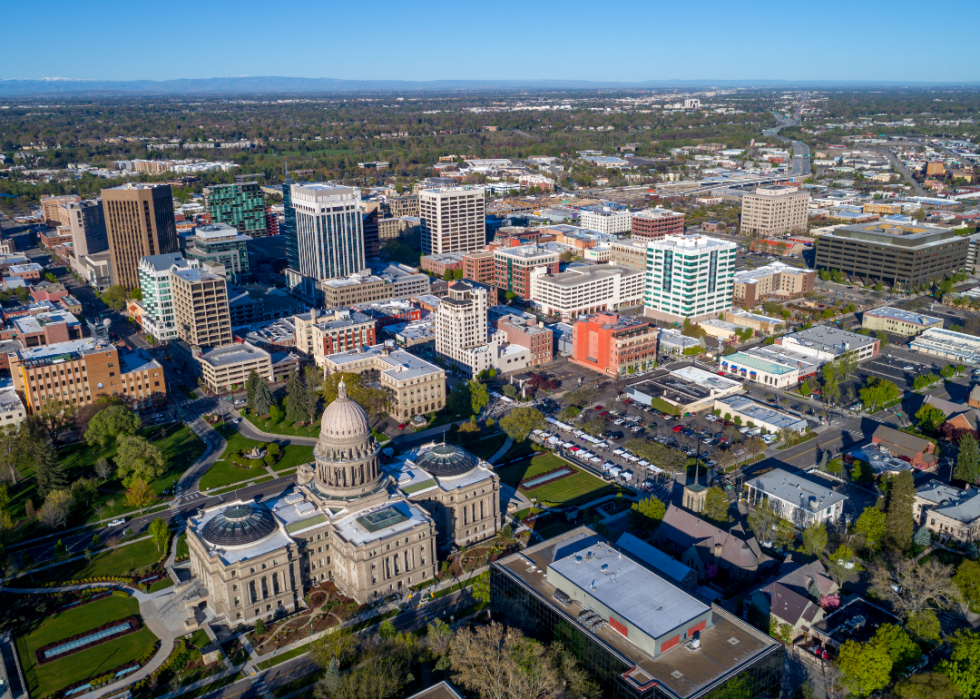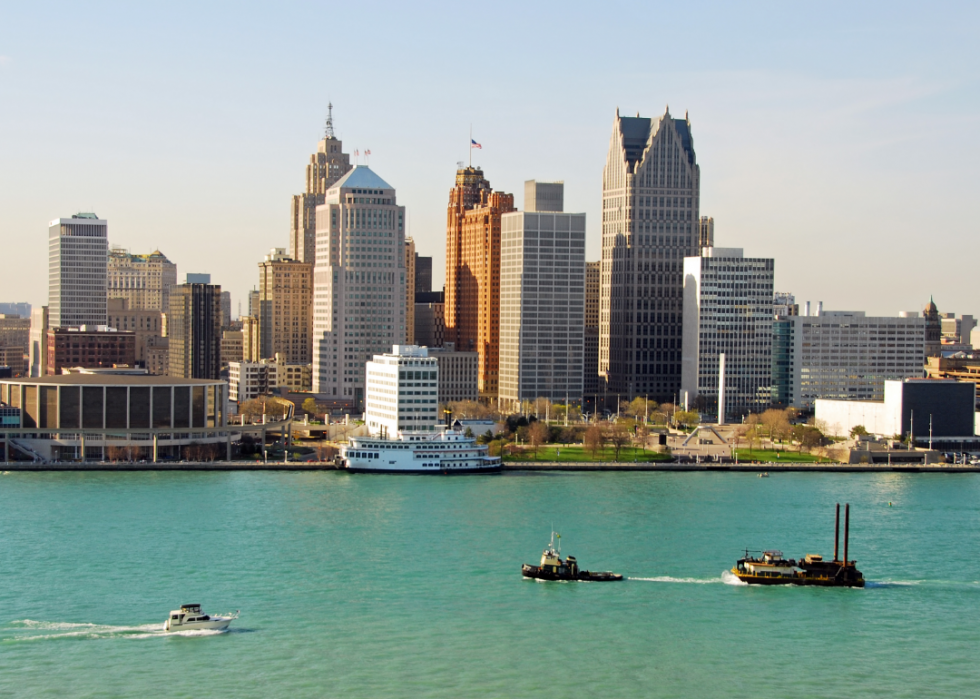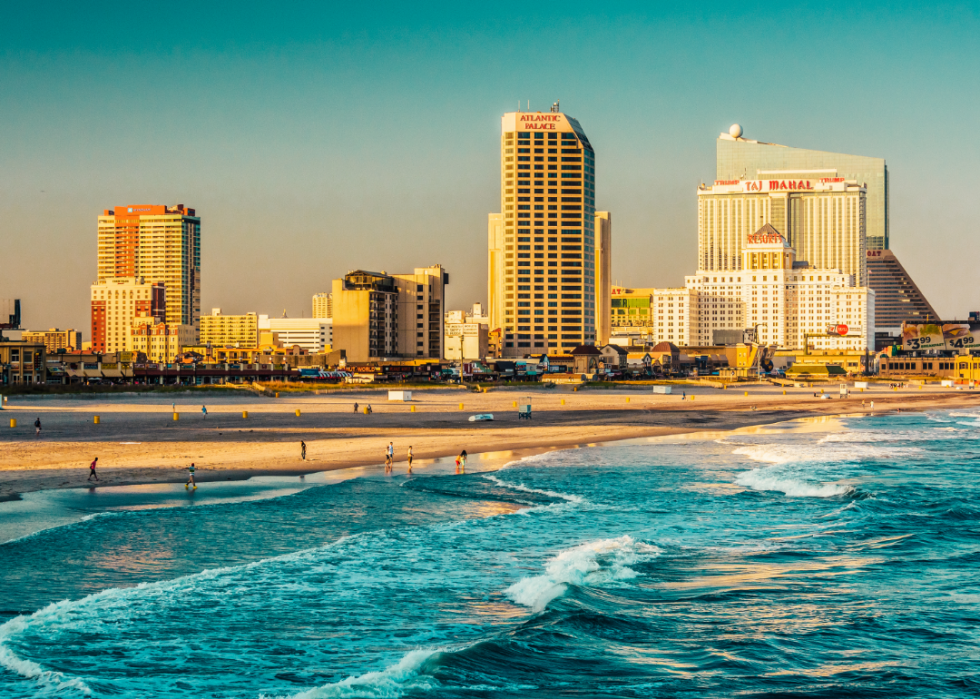
States with the most new businesses in 2020
Every business starts as a small business. It's that perseverance of the "American Dream" and those childhood plans of success that keep the U.S. economy humming and the nation producing the entrepreneurs of tomorrow.
Recessions are hard on all businesses, but an increase in business formations is often seen during and after one. New ideas are born and old ideas are taken off the proverbial back burner in an economic downturn.
Today, it's easier than ever to create a website and start a new venture in a matter of hours. Online search analysis points to new business trends over the past year that include home improvement, pets, beauty, fitness, gaming, and more.
Another expanding industry has been new home construction. Five states lead the pack when comparing the number of houses per 10K people: Idaho, Utah, Colorado, Florida, and Texas. Large metro leaders include Austin, Texas; Nashville, Tennessee; and Raleigh, North Carolina.
Through tax incentives, grant programs, and small business assistance programs throughout the country, state governments illustrate that they welcome new and relocating businesses. Businesses—both big and small—are good for every state's economy, its citizens, and everyday living.
In recent years, efforts have been focused on economic development zones and bringing businesses into rural areas that need jobs, an economic boost, basic essentials, and a stronger sense of community.
In order to determine the states with the most new businesses in 2020, Stacker analyzed business formation data released by the U.S. Census Bureau on Oct. 11, 2020. Data is updated weekly. States are ranked by the number of new small businesses in 2020 per 1,000 people. The Census Bureau defines high-propensity as "business applications that have a high propensity of turning into businesses with payroll." Businesses with planned wages are defined as "high-propensity business applications that indicate a first wages‐paid date on the IRS Form."
The Tax Foundation's State Business Tax Climate Index was referenced to identify additional tax reasons that may have led to the growth or decline of new business in states across the country in 2020. The Index reports that businesses benefit in states such as Wyoming, Nevada, and South Dakota, where there is no corporate or individual income tax. Similarly, Alaska has no state-level sales tax and no individual income tax, while Florida has no individual income tax. Additional states with no sales tax, according to The Tax Foundation, include New Hampshire, Montana, and Oregon. On the flip side of the coin, states such as New Jersey are harder for new business owners; the state has some of the highest property taxes, and the second-highest corporate income tax rate in the United States.

#51. West Virginia
- Total new businesses in 2020: 8,710 (#45 overall; 8.4% increase since 2019)
- New businesses per 1,000 people: 4.9
- Business types:
--- New high-propensity businesses: 3,240 (37.2%)
--- New businesses with planned wages: 1,570 (18%)
While West Virginia offers limited flat land for building a new business, there’s generally a low cost of living and affordable real estate. Its proximity to the East Coast, Canada, and shipping ports can also be an advantage for some businesses.

#50. Iowa
- Total new businesses in 2020: 18,530 (#36 overall; 8.4% increase since 2019)
- New businesses per 1,000 people: 5.9
- Business types:
--- New high-propensity businesses: 6,280 (33.9%)
--- New businesses with planned wages: 2,760 (14.9%)
Forming a corporation may take longer in Iowa, and limited liability companies (LLCs) have limits, but overall, Iowa offers several business tax incentives, such as a new jobs tax credit, and a research activities tax credit. New S corporations in Iowa also do not pay income tax.

#49. Maine
- Total new businesses in 2020: 8,320 (#46 overall; 6% increase since 2019)
- New businesses per 1,000 people: 6.2
- Business types:
--- New high-propensity businesses: 3,460 (41.6%)
--- New businesses with planned wages: 1,690 (20.3%)
LLCs in Maine benefit from no franchise or privilege tax, and the labor costs are generally 6% less than the national average. Popular business incentives exist for those starting businesses in specific sectors such as information technology, finance, and biotechnology.

#48. Nebraska
- Total new businesses in 2020: 12,200 (#41 overall; 5.1% increase since 2019)
- New businesses per 1,000 people: 6.3
- Business types:
--- New high-propensity businesses: 4,390 (36%)
--- New businesses with planned wages: 2,070 (17%)
Nebraska offers new and relocating companies sales tax exemptions on manufacturing equipment, common carrier vehicles, and utilities used in manufacturing. The state has available sites, short commute times, low cost of living, and aggressive local incentives.

#47. Kansas
- Total new businesses in 2020: 18,960 (#35 overall; 7.4% increase since 2019)
- New businesses per 1,000 people: 6.5
- Business types:
--- New high-propensity businesses: 6,900 (36.4%)
--- New businesses with planned wages: 3,210 (16.9%)
The Kansas High Performance Incentive Program (HPIP) provides a 10% tax credit to employers who qualify, are committed to teaching new skills to workers, and pay above average wages. A job creation incentive program called PEAK allows businesses to retain, or be refunded, 95% of the payroll withholding tax for new jobs created in the state.

#46. Kentucky
- Total new businesses in 2020: 29,450 (#31 overall; 13.2% increase since 2019)
- New businesses per 1,000 people: 6.6
- Business types:
--- New high-propensity businesses: 9,320 (31.6%)
--- New businesses with planned wages: 3,970 (13.5%)
With a population just under 5 million, Kentucky offers a competitive tax structure and easy access to commercial airports, shipping hubs, and interstate highways. The state boasts more than 400 international companies as well as several Fortune 25 corporations.

#45. South Dakota
- Total new businesses in 2020: 5,880 (#49 overall; 2.3% decrease since 2019)
- New businesses per 1,000 people: 6.6
- Business types:
--- New high-propensity businesses: 2,220 (37.8%)
--- New businesses with planned wages: 1,190 (20.2%)
Despite South Dakota not levying individual or corporate income taxes, the state saw a decrease in the percentage of new businesses opened in 2020. That could be because South Dakota had the fewest Covid-19 restrictions.

#44. North Dakota
- Total new businesses in 2020: 5,100 (#50 overall; 3.9% decrease since 2019)
- New businesses per 1,000 people: 6.7
- Business types:
--- New high-propensity businesses: 1,910 (37.5%)
--- New businesses with planned wages: 1,000 (19.6%)
Falling oil prices in 2020, coupled with the majority of North Dakota’s oil drilling rigs being offline, has resulted in a less-than-optimistic business outlook for the state.

#43. New Hampshire
- Total new businesses in 2020: 9,130 (#44 overall; 2.9% increase since 2019)
- New businesses per 1,000 people: 6.7
- Business types:
--- New high-propensity businesses: 2,870 (31.4%)
--- New businesses with planned wages: 1,380 (15.1%)
The Division of Economic Development in New Hampshire assists new and existing businesses with grant, permit, and technical assistance. The state also promotes low taxes and employee layoff aversion assistance for those who qualify.

#42. Rhode Island
- Total new businesses in 2020: 7,210 (#47 overall; 7.7% increase since 2019)
- New businesses per 1,000 people: 6.8
- Business types:
--- New high-propensity businesses: 2,670 (37%)
--- New businesses with planned wages: 1,280 (17.8%)
Rhode Island offers tax credits, grants, and other incentives to lure businesses to the state. For those who qualify, Rebuild Rhode Island will help finance real estate projects if they fall short of funding; redeemable tax credits can cover up to 30% of project costs.

#41. New Mexico
- Total new businesses in 2020: 14,420 (#39 overall; 1.8% increase since 2019)
- New businesses per 1,000 people: 6.9
- Business types:
--- New high-propensity businesses: 4,800 (33.3%)
--- New businesses with planned wages: 2,230 (15.5%)
The cost of living and doing business in New Mexico is considered fair. But, many shy away from setting down business roots in the state when they consider the low quality of life, difficult access to capital, and general business unfriendliness.

#40. Massachusetts
- Total new businesses in 2020: 48,550 (#22 overall; 5.2% increase since 2019)
- New businesses per 1,000 people: 7
- Business types:
--- New high-propensity businesses: 19,330 (39.8%)
--- New businesses with planned wages: 6,900 (14.2%)
Massachusetts is considered a leading technology state, with a growing tech industry and jobs. Qualifying companies can apply for the Investment Tax Credit, and the Economic Development Incentive Program Credit.

#39. Wisconsin
- Total new businesses in 2020: 41,630 (#25 overall; 22.1% increase since 2019)
- New businesses per 1,000 people: 7.1
- Business types:
--- New high-propensity businesses: 13,930 (33.5%)
--- New businesses with planned wages: 5,820 (14%)
The Wisconsin Economic Development Corporation offers a range of assistance to new and existing businesses in the state. Options range from minority business development to industrial revenue bonds, and tax credits for new and expanding businesses within the development opportunity zone.

#38. Vermont
- Total new businesses in 2020: 4,580 (#51 overall; 2.2% increase since 2019)
- New businesses per 1,000 people: 7.3
- Business types:
--- New high-propensity businesses: 1,800 (39.3%)
--- New businesses with planned wages: 790 (17.2%)
Vermont offers a plethora of business advantages, such as grants, small business loans, tax credits, and no income tax on S corporations. Higher taxes apply to corporations, but there are a number of tax credits available to offset the increase.

#37. Minnesota
- Total new businesses in 2020: 41,780 (#24 overall; 15.2% increase since 2019)
- New businesses per 1,000 people: 7.4
- Business types:
--- New high-propensity businesses: 14,800 (35.4%)
--- New businesses with planned wages: 6,100 (14.6%)
Minnesota offers businesses low operating costs, streamlined regulatory processes, a strong sense of community, and competitive tax rates. Businesses established in Opportunity Zones benefit from additional tax benefits, and financing programs are in place to help employers create jobs.

#36. Oregon
- Total new businesses in 2020: 31,300 (#30 overall; 1.9% increase since 2019)
- New businesses per 1,000 people: 7.4
- Business types:
--- New high-propensity businesses: 11,880 (38%)
--- New businesses with planned wages: 5,420 (17.3%)
There’s no state sales tax in Oregon, and the state also allows net operating losses from corporations to be carried, without a cap, for up to 15 years. Businesses in Oregon that create at least five new full-time jobs are also eligible to deduct state business income tax liability.

#35. Pennsylvania
- Total new businesses in 2020: 99,570 (#11 overall; 23% increase since 2019)
- New businesses per 1,000 people: 7.8
- Business types:
--- New high-propensity businesses: 31,820 (32%)
--- New businesses with planned wages: 11,680 (11.7%)
Pennsylvania offers a low cost of living and close proximity to major cities such as Boston, New York City, and Washington D.C. The state boasts wide access to startup venture capital funding, and is home to Ben Franklin Technology Partners, one of the most established economic development programs in the country.

#34. Washington
- Total new businesses in 2020: 59,740 (#18 overall; 6.2% increase since 2019)
- New businesses per 1,000 people: 7.8
- Business types:
--- New high-propensity businesses: 20,680 (34.6%)
--- New businesses with planned wages: 9,610 (16.1%)
Washington has no personal or corporate income tax. The state is home to innovative companies such as Starbucks, Amazon, and Microsoft. A centralized export hub and robust supply chain are two more advantages for new and relocating businesses.

#33. Indiana
- Total new businesses in 2020: 55,230 (#21 overall; 31.2% increase since 2019)
- New businesses per 1,000 people: 8.2
- Business types:
--- New high-propensity businesses: 18,120 (32.8%)
--- New businesses with planned wages: 7,350 (13.3%)
A low cost of living and affordable housing draws some business owners to Indiana. What keeps them there is the second-lowest property tax rate in the United States, and a high survival rate for startup businesses.

#32. Connecticut
- Total new businesses in 2020: 29,440 (#32 overall; 12.4% increase since 2019)
- New businesses per 1,000 people: 8.3
- Business types:
--- New high-propensity businesses: 8,750 (29.7%)
--- New businesses with planned wages: 3,240 (11%)
Business owners in Connecticut benefit from the high disposable income of its residents. The state has one of the highest per capita incomes in the country, driven mostly by the construction, finance, and insurance industries.

#31. Arkansas
- Total new businesses in 2020: 25,500 (#33 overall; 27.9% increase since 2019)
- New businesses per 1,000 people: 8.4
- Business types:
--- New high-propensity businesses: 8,850 (34.7%)
--- New businesses with planned wages: 3,520 (13.8%)
Arkansas has taken great strides to build up its workforce and prepare it for incoming companies. The state was the first in the United States to offer computer science courses for high school students. And the state’s ArFuture Grants program covers the tuition for students pursuing jobs in fields that are in-demand.

#30. Ohio
- Total new businesses in 2020: 101,030 (#10 overall; 34.7% increase since 2019)
- New businesses per 1,000 people: 8.6
- Business types:
--- New high-propensity businesses: 30,900 (30.6%)
--- New businesses with planned wages: 11,710 (11.6%)
Sales-and-use tax can be on the high end in Ohio; most counties charge 5.75%, with one county going as high as 8%. However, the state does not levy a corporate income tax on Ohio businesses, and there’s a healthy level of community support for local business.

#29. Hawaii
- Total new businesses in 2020: 12,330 (#40 overall; 6.5% increase since 2019)
- New businesses per 1,000 people: 8.7
- Business types:
--- New high-propensity businesses: 4,290 (34.8%)
--- New businesses with planned wages: 1,610 (13.1%)
Hawaii’s close proximity to Asian destinations, coupled with its multicultural residents, helps many businesses easily test new markets outside the United States. A related benefit is that goods or services that are exported overseas are exempt from General Excise Tax.

#28. Oklahoma
- Total new businesses in 2020: 35,170 (#29 overall; 9.5% increase since 2019)
- New businesses per 1,000 people: 8.9
- Business types:
--- New high-propensity businesses: 11,730 (33.4%)
--- New businesses with planned wages: 5,020 (14.3%)
Business incentive programs like the Oklahoma Quality Jobs Program and Oklahoma Enterprise Zones offer numerous tax benefits for qualifying new businesses. Overall, business owners have access to skilled labor at a lower cost than other states, and a business climate that encourages growth.

#27. Tennessee
- Total new businesses in 2020: 60,790 (#17 overall; 33.9% increase since 2019)
- New businesses per 1,000 people: 8.9
- Business types:
--- New high-propensity businesses: 20,370 (33.5%)
--- New businesses with planned wages: 8,390 (13.8%)
Home to Fortune 500 companies such as FedEx, HCA Healthcare, and Dollar General Corp., Tennessee has no personal income tax, low regulatory burdens, and strategic shipping and distribution lanes. Angel investor programs like LaunchTN are anxious to help Tennessee businesses succeed.

#26. California
- Total new businesses in 2020: 353,980 (#2 overall; 21.9% increase since 2019)
- New businesses per 1,000 people: 9
- Business types:
--- New high-propensity businesses: 160,900 (45.5%)
--- New businesses with planned wages: 50,970 (14.4%)
Great weather, booming tech and entertainment industries, and a growing economy are hard to resist. Many business owners have simply grown to accept California’s habit of testing and changing regulations, and high business and personal taxes.

#25. Missouri
- Total new businesses in 2020: 55,370 (#20 overall; 17.1% increase since 2019)
- New businesses per 1,000 people: 9
- Business types:
--- New high-propensity businesses: 17,820 (32.2%)
--- New businesses with planned wages: 8,210 (14.8%)
A variety of programs exist in Missouri to help businesses. The Missouri Works Program helps new companies create jobs, and existing companies expand. Businesses that provide opportunities for the state’s youth are eligible to receive tax credits totalling up to 50% of the businesses monetary contribution.

#24. Alaska
- Total new businesses in 2020: 6,810 (#48 overall; 5% increase since 2019)
- New businesses per 1,000 people: 9.3
- Business types:
--- New high-propensity businesses: 2,370 (34.8%)
--- New businesses with planned wages: 1,260 (18.5%)
Alaska offers business tax credits for hiring veterans, building a business in areas that need development, and contributing to Alaska universities and nonprofit colleges. Several specialized loan programs also exist to benefit women entrepreneurs, small businesses, and rural development.

#23. Alabama
- Total new businesses in 2020: 45,780 (#23 overall; 41.1% increase since 2019)
- New businesses per 1,000 people: 9.3
- Business types:
--- New high-propensity businesses: 14,060 (30.7%)
--- New businesses with planned wages: 5,240 (11.4%)
Business growth has been booming in Alabama this year. Several factors could be causing the uptick, including Lockhead Martin hiring 275 more employees to work on futuristic hypersonics technologies, and a new Mazda Toyota Manufacturing USA plant gearing up to hire 1,700. Aerospace manufacturers in the state continue to expand, and Alabama automakers continue to add new models.

#22. Idaho
- Total new businesses in 2020: 17,400 (#38 overall; 1.4% increase since 2019)
- New businesses per 1,000 people: 9.7
- Business types:
--- New high-propensity businesses: 6,060 (34.8%)
--- New businesses with planned wages: 3,110 (17.9%)
Idaho's Tax Reimbursement Incentive Program rewards businesses that create jobs with full-time wages above the county average. A Workforce Development program reimburses business owners up to $3,000 per employee for customized training.

#21. Arizona
- Total new businesses in 2020: 71,530 (#15 overall; 16.3% increase since 2019)
- New businesses per 1,000 people: 9.8
- Business types:
--- New high-propensity businesses: 21,590 (30.2%)
--- New businesses with planned wages: 8,320 (11.6%)
Arizona businesses enjoy easy access to business grants, low-interest business financing, job training assistance, and help with rural development.

#20. Virginia
- Total new businesses in 2020: 84,940 (#12 overall; 20.3% increase since 2019)
- New businesses per 1,000 people: 10
- Business types:
--- New high-propensity businesses: 25,730 (30.3%)
--- New businesses with planned wages: 10,140 (11.9%)
Virginia has a large concentration of highly skilled tech and IT workers.The Major Business Facility Job Tax Credit allows qualified companies to receive $1,000 tax credit for each new full-time employee, or two part-time employees, hired over a given threshold.

#19. North Carolina
- Total new businesses in 2020: 105,370 (#8 overall; 27.7% increase since 2019)
- New businesses per 1,000 people: 10
- Business types:
--- New high-propensity businesses: 33,700 (32%)
--- New businesses with planned wages: 13,030 (12.4%)
Home to high-ranking companies such as Bank of America, Compass Group, and Duke Energy, North Carolina offers a number of tax credits. The Historic Rehabilitation tax credit allows a 20% credit to those who rehabilitate an income-producing historic structure. The state also offers eligible businesses exemptions from sales and use taxes.

#18. New York
- Total new businesses in 2020: 200,200 (#5 overall; 9.7% increase since 2019)
- New businesses per 1,000 people: 10.3
- Business types:
--- New high-propensity businesses: 87,770 (43.8%)
--- New businesses with planned wages: 19,810 (9.9%)
New York is a cultural melting pot, welcoming a wide variety of businesses to a densely populated environment in many cases. The New Markets tax credit program incentivizes businesses and developers to focus on low-income neighborhoods, while START-UP NY offers new and expanding businesses the option to run their operations tax free for 10 years if they’re on or near an eligible university or college campus.

#17. Michigan
- Total new businesses in 2020: 103,750 (#9 overall; 41% increase since 2019)
- New businesses per 1,000 people: 10.4
- Business types:
--- New high-propensity businesses: 32,640 (31.5%)
--- New businesses with planned wages: 11,040 (10.6%)
Detroit has seen a resurgence in recent years. Michigan, as a whole, has benefited from a booming construction industry and expanding automotive corporations.

#16. Texas
- Total new businesses in 2020: 306,020 (#3 overall; 25.6% increase since 2019)
- New businesses per 1,000 people: 10.6
- Business types:
--- New high-propensity businesses: 99,900 (32.6%)
--- New businesses with planned wages: 40,670 (13.3%)
As fifth-generation, aka 5G, continues to expand across the country, Texas is home to many of the big players in telecom, such as AT&T, Verizon, and Sprint. New business owners are interested in the highly skilled labor available in the state as well as a favorable tax climate that includes no personal income tax.

#15. Illinois
- Total new businesses in 2020: 137,760 (#6 overall; 52% increase since 2019)
- New businesses per 1,000 people: 10.9
- Business types:
--- New high-propensity businesses: 56,080 (40.7%)
--- New businesses with planned wages: 17,180 (12.5%)
Illinois is one of the highest taxed states, but businesses registered as S corporations can opt to use pass-through taxation, passing the income or loss of the company on to stockholders. Beneficial business programs offered to Illinois businesses incentivize entrepreneurs who build in river redevelopment or enterprise zones.

#14. Montana
- Total new businesses in 2020: 11,620 (#43 overall; 3.3% increase since 2019)
- New businesses per 1,000 people: 10.9
- Business types:
--- New high-propensity businesses: 3,840 (33%)
--- New businesses with planned wages: 1,740 (15%)
Montana continues to earn high marks for entrepreneurship. The state does not charge sales tax, boasts one of the nation’s highest high school graduation rates, and offers apprenticeship tax credits. Attractive corporate income tax credits, property tax incentives, and natural resource tax incentives are also big draws for business owners.

#13. South Carolina
- Total new businesses in 2020: 57,400 (#19 overall; 39.9% increase since 2019)
- New businesses per 1,000 people: 11.1
- Business types:
--- New high-propensity businesses: 16,030 (27.9%)
--- New businesses with planned wages: 6,230 (10.9%)
Nearly 80% of South Carolina businesses survive their first year, and the state’s economy ranks as one of the strongest in the region. The leading small business in the state is food services and accommodations.

#12. New Jersey
- Total new businesses in 2020: 105,910 (#7 overall; 17.7% increase since 2019)
- New businesses per 1,000 people: 11.9
- Business types:
--- New high-propensity businesses: 31,160 (29.4%)
--- New businesses with planned wages: 11,080 (10.5%)
New Jersey is densely populated and has a low unemployment rate. Despite high rent and high property tax rates, business owners are willing to pay for the opportunity to have a diverse workforce and easy access to supportive local communities and nearby New York City.

#11. Utah
- Total new businesses in 2020: 40,360 (#28 overall; 1.1% increase since 2019)
- New businesses per 1,000 people: 12.6
- Business types:
--- New high-propensity businesses: 12,010 (29.8%)
--- New businesses with planned wages: 5,640 (14%)
Utah offers a flat income tax rate of 4.95%, which has proven beneficial for many businesses. A well-managed government, effective and transparent regulations, and efficient transportation systems also help to keep Utah top of mind for business planners.

#10. Maryland
- Total new businesses in 2020: 77,360 (#13 overall; 28.1% increase since 2019)
- New businesses per 1,000 people: 12.8
- Business types:
--- New high-propensity businesses: 23,380 (30.2%)
--- New businesses with planned wages: 8,290 (10.7%)
Access to the Port of Baltimore, four international airports, and major interstates is an attractive benefit for businesses that use shipping and transportation. Funding sources help Maryland businesses with the costs of international marketing, employee training, and more.

#9. Colorado
- Total new businesses in 2020: 73,870 (#14 overall; 7.1% increase since 2019)
- New businesses per 1,000 people: 12.8
- Business types:
--- New high-propensity businesses: 24,510 (33.2%)
--- New businesses with planned wages: 9,450 (12.8%)
The tech and cannabis industries are becoming big businesses in Colorado. However, since its approval in 1982, The Gallagher Amendment, which is up for repeal in this November’s election, has increasingly placed an unbalanced property tax burden on Colorado businesses.

#8. Nevada
- Total new businesses in 2020: 40,730 (#27 overall; 27.2% increase since 2019)
- New businesses per 1,000 people: 13.2
- Business types:
--- New high-propensity businesses: 13,600 (33.4%)
--- New businesses with planned wages: 5,290 (13%)
Nevada has no state, income, or franchise taxes, and owners can choose to remain anonymous. The state also allows one person to form a corporation, with no director needed, and will not tax corporate shares or profits.

#7. Mississippi
- Total new businesses in 2020: 41,340 (#26 overall; 70.5% increase since 2019)
- New businesses per 1,000 people: 13.9
- Business types:
--- New high-propensity businesses: 13,470 (32.6%)
--- New businesses with planned wages: 4,690 (11.3%)
Online business is growing in Mississippi: A study conducted by the U.S. Chamber of Commerce and Amazon states Mississippi has been growing its digital sales faster than any other state. There are numerous tax and business incentives for starting or growing a company in the Magnolia state, ranging from broadband technology credits to a clean energy initiative program.

#6. Louisiana
- Total new businesses in 2020: 68,420 (#16 overall; 60.6% increase since 2019)
- New businesses per 1,000 people: 14.7
- Business types:
--- New high-propensity businesses: 19,440 (28.4%)
--- New businesses with planned wages: 6,520 (9.5%)
Louisiana has seen an uptick in LLCs interested in buying real estate and offering consulting services. FastStart, the state’s workforce training program, offers customized screening, recruiting, and training solutions at no cost to eligible companies.

#5. Washington D.C.
- Total new businesses in 2020: 11,940 (#42 overall; 20.6% increase since 2019)
- New businesses per 1,000 people: 16.9
- Business types:
--- New high-propensity businesses: 3,520 (29.5%)
--- New businesses with planned wages: 1,410 (11.8%)
Tech companies may qualify for Washington D.C.’s Qualified High Tech Companies Program, which eliminates franchise taxes for the first five years of business, provides new-hire wage tax credit, and has a five-year freeze on real property taxes. Other businesses can explore the Main Streets Program, the Work Opportunity Tax Credit, and more.

#4. Florida
- Total new businesses in 2020: 397,320 (#1 overall; 28.4% increase since 2019)
- New businesses per 1,000 people: 18.5
- Business types:
--- New high-propensity businesses: 146,870 (37%)
--- New businesses with planned wages: 37,160 (9.4%)
There is no personal tax in Florida, and overall, a low tax burden. An affordable cost of living paired with easy access to international airports, shipping ports, and highway and rail networks, add to Florida’s appeal.

#3. Georgia
- Total new businesses in 2020: 215,710 (#4 overall; 59.8% increase since 2019)
- New businesses per 1,000 people: 20.3
- Business types:
--- New high-propensity businesses: 63,930 (29.6%)
--- New businesses with planned wages: 21,750 (10.1%)
Georgia, Atlanta specifically, has become a major hub for growing industries such as financial technology, FinTech; distribution and supply chain; healthcare IT; and advanced manufacturing. Atlanta’s international airport provides easy access to domestic and international destinations.

#2. Delaware
- Total new businesses in 2020: 24,020 (#34 overall; 19.1% increase since 2019)
- New businesses per 1,000 people: 24.7
- Business types:
--- New high-propensity businesses: 8,300 (34.6%)
--- New businesses with planned wages: 2,360 (9.8%)
Delaware is considered a preferred state for incorporating a business. Venture capitalists are said to like investing in Delaware businesses, and even businesses that are formed in the state, but don't run a business within state lines, do not pay state corporate income tax. There's flexibility and privacy in corporate structures, and the state court system is well respected.

#1. Wyoming
- Total new businesses in 2020: 18,170 (#37 overall; 27.9% increase since 2019)
- New businesses per 1,000 people: 31.4
- Business types:
--- New high-propensity businesses: 5,610 (30.9%)
--- New businesses with planned wages: 1,670 (9.2%)
The Wyoming Food Freedom Act, passed in 2015, opened the floodgates to let people sell local homegrown/homemade food to other people without regulations. “Inspected” processors can sell their goods online, which many have started to do this past year.



